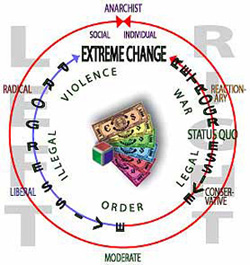 |
 |
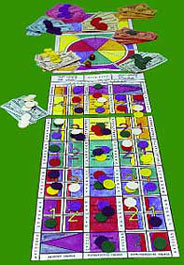 |
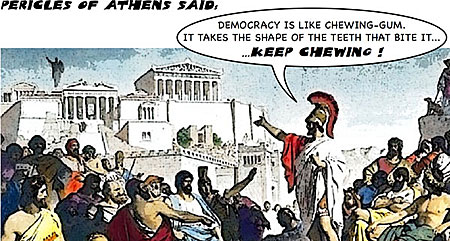 |
It is the duty of all adult citizens to vote in local, provincial, and national elections. Citizens should help shape public opinion by speaking out on important issues and by supporting the political party of their choice. Education through information is a characteristic of democracy.
An important quality of democratic government is on trying to get people to act on the basis of understanding, dialogue, negotiation, bargaining, and ultimately, voluntary citizen cooperation and agreement instead of force.
Democratic governments are likely to be unstable whenever people become deeply divided and suspicious of one another. Sometimes racial, ethnic, or religious differences make democracies difficult to operate. In such instances, the people may not see one another as legitimate and trustworthy partners in the enterprise of government. |
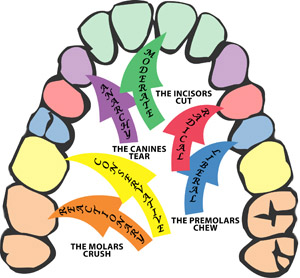
|
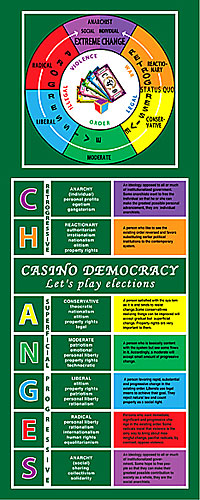 |

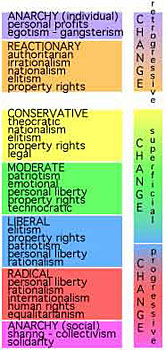 |
ANARCHY An ideology opposed to all or much of
institutionalized government. Some anarchists want to free the individual
so that he or she can make the greatest possible personal advancement,
they are the individual anarchists. Others hope to free people so that
they can make their greatest possible contribution to society as a whole,
they are the social anarchists.
CONSERVATIVE A person
who is satisfied with the system as it is and tends to resist change.
Some conservatives, realizing that things could be improved, will accept
gradual, very superficial and progressive change. Property rights tend
to be very important to conservatives.
MODERATE A person who
is basically content with the system but sees some flaws in it. Accordingly,
a moderate will accept a small amount of progressive change.
LIBERAL A person who favors
rapid, substantial, and progressive change in the existing order. Liberals
usually resort to legal means to achieve their goals. The classic liberals
believed in human reason, to them property was a human right. Contemporary
liberals reject natural law and count property among the social rights.
RADICAL A person who wants
immediate, significant and progressive change in the existing order.
Some radicals insist that violence is the only way to bring about meaningful
change, pacifist radicals, by contrast, oppose violence altogether.
REACTIONARY A person who
would like to see the existing order reversed and favors substituting
earlier political institutions for the contemporary system. |
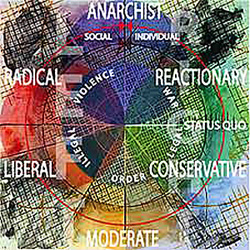 ideals 80x80cm digital print ideals 80x80cm digital print
The
characteristics of democracy differ from one ideology to another.
Elections give the people a chance to choose their leaders and express
their opinions on issues. The democratic process permits citizens to
vote periodically by secret ballot, free from force or bribes. It also
requires that election results be protected against dishonesty.
Democracies decide votes by plurality, which is called majority rule.
Majority rule is based on the idea that if all citizens are equal, the
judgment of the many will be better than the judgment of the few and
guarantee that certain rights can never be taken from the people, even
by extremely large majorities, included the basic freedoms of speech,
press, assembly, and religious worship. The majority also must recognize
the right of the minority to try to become the majority by legal means.
Government officials are subject to the law and are accountable to the
people and may be removed from office for lawless conduct or for other
serious reasons. The communications media help keep elected officials
sensitive to public opinion. Constitutions state the powers and duties
of government and limit what the government may do. However, certain
customs and conventions, as well as certain major documents and many
laws, are widely accepted as the "basic rules of the system".
It is the duty of the justice system to protect the integrity of the
"rules" and the rights of individuals under these rules, especially
against the government itself. |
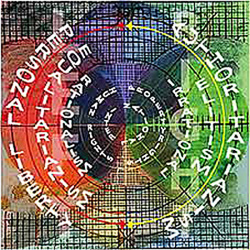 values 80x80cm digital print values 80x80cm digital print
Most
modern democracy is representative democracy when an elected number
of fellow citizens is making decisions about laws and other matters.
An assembly of representatives may be called a council, a legislature,
a parliament, or a congress. Most decisions are based on majority
rule. Such representation awards a political party a percentage of
seats in the legislature in proportion to its share of the total vote
cast.
The most important aspects of the democratic way of life have been
the principles of individual equality and freedom. Citizens in a democracy
should be entitled to equal protection of their persons, possessions
and rights, have equal opportunity to pursue their lives and careers
and have equal rights of political participation. They should be free,
within the framework of the law, to believe, behave, and express themselves
as they wish, including freedom of religion, freedom of the press
and freedom of speech.
Some people demand to increase the role of government in society in
order to make
material conditions more equal for everyone. But other people are
concerned that the extension of government's role in such areas as
welfare, education, employment, and housing may subject them to government
regulation. The supporters of more government involvement belong to
the left of the political spectrum. The critics of more government
involvement belong to the right. Their division is one of the main
themes of controversy and discussion in modern democratic societies. |
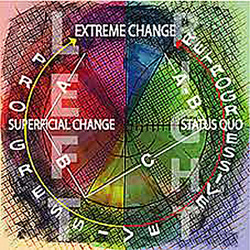 change 80x80cm digital print change 80x80cm digital print
Political change and renewal of government is fundamental to any democracy. With the status quo as point of departure we have two main directions of change : one is progressive the other retrogressive.
Progressive change means towards something new and different. Retrogressive change refers the return to policies or institutions that have been used in the past. The depth of a proposed change determines the desired amount of renewal (major or minor changes) that will adjust the working of a democracy. The further people find themselves from the status quo the more intense their desire for change. The closer people are to the status quo the more socially acceptable are their methods for change.
A = extremely dissatisfied, demanding radical change and revolt,
B = proposing to modify society but leave its foundations intact,
C = content and supports only superficial change. |
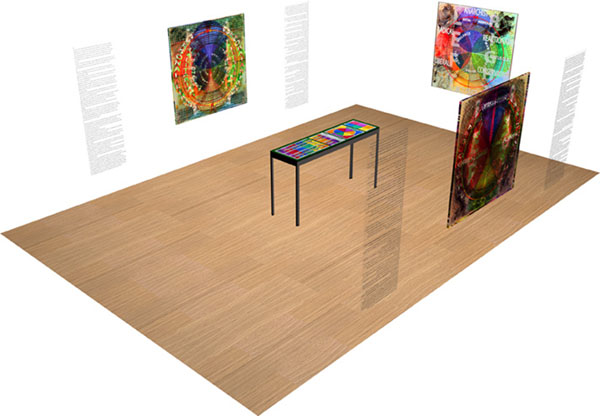
installation for the game |
back to top  |